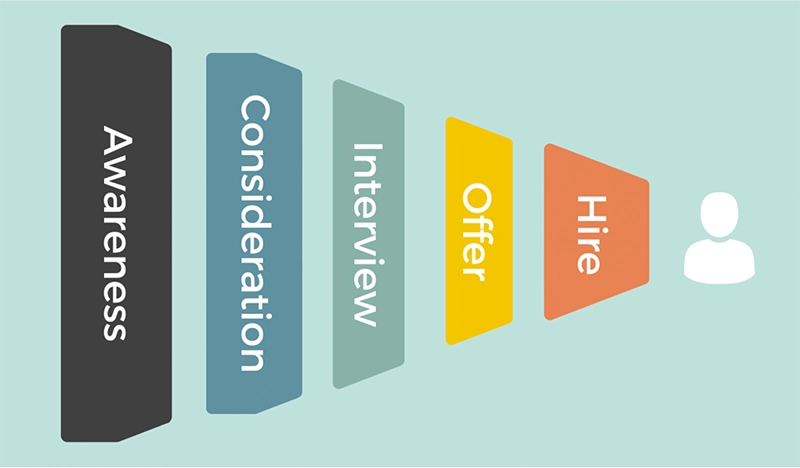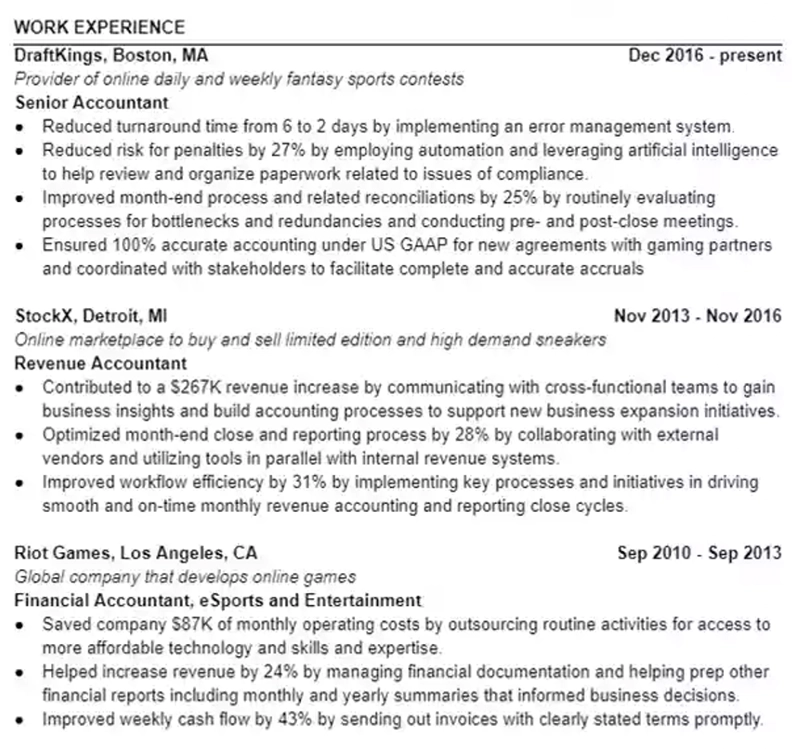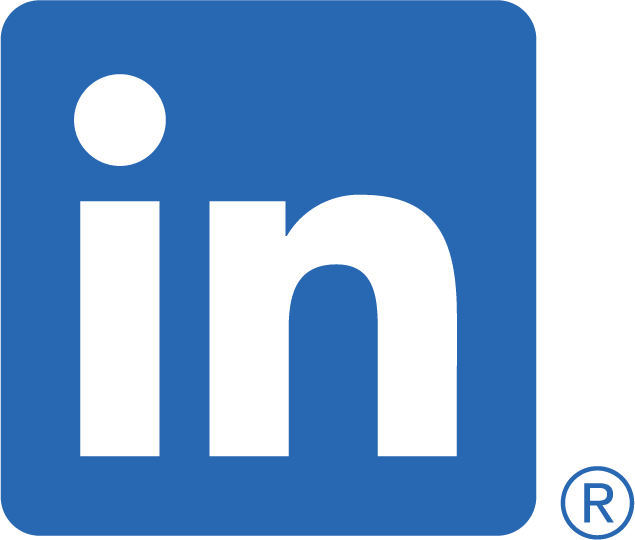While the classic reference section has been standard on resumes for decades, unless the job posting you’re applying for specifically asks you to list references, leave them out of your resume. Especially if the job is in the United States, most employers don’t expect to see a reference list and wouldn’t utilize one.
In addition to taking up prime real estate on your resume that could be used more effectively, listing contact information for people you’ve worked with in the past can breach personal data protection laws.
When it comes to your job skills and readiness to move up in your career, the achievements you include in your resume should speak for themselves.
Your resume is more than a document where you simply dump your work history and hope your future employer can see why you're the best candidate for the job. And pointing recruiters and hiring managers to people you’ve known throughout your career won’t do much to help you as a candidate.
In this article, we’ll explain why including a list of professional references will weaken your resume, and what you should do instead to increase your chances of landing your next job.
Let’s get started.
Why you shouldn’t list references on a resume in 2023
The corporate world is moving away from asking for professional references. If the job posting specifically asks for references, they should be handled in a separate email. But professional references should not be on a modern resume.
Here are some reasons why a list of references won’t help you (and can hurt you) as a job seeker, and why they’re a waste of time for recruiters and hiring managers.
1. You’re giving people influence in your candidacy
The truth is, we never know what people will say about us when we’re out of the room. Trusting a former supervisor, colleague, or character reference to argue your case for you with a recruiter takes a lot of power out of your hands.
People can be surprisingly vindictive. Even if they appear to be supportive and happy that you’re looking to advance your career, their claws can come out when they’re on the phone with a recruiter. Particularly if you’ve listed your current employer as a reference, they may be bitter that you’re looking for work elsewhere and be tempted to clip your wings.
Not including references on your resume allows you to control the narrative. Starting with your professional headline and professional summary, and throughout your work history section, you’re showing your potential next employer who you are as a candidate and why you’re the best fit for the open position — instead of trusting someone else to tell them for you.
2. You’re gutting the power of your pitch
Every inch of your resume should be devoted to pitching you as the best candidate for the job, and you have a very limited amount of space in which to do this. If you’re still in the first 10 years of your career, your resume should be one page only. If you’ve been working for more than 10 years, you can use two pages but may want to stick to one anyway.
Recruiters spend an average of 7.4 seconds with each resume before deciding whether to send it up the chain of command or to the discard pile. Packing the most information into the least amount of words is how you make the most of that time.
If you want your resume to stand out from your competitors, you have to capture their attention immediately. You do this by creating a powerful, unified pitch throughout your resume. You don’t do this with fancy formatting and unnecessary graphics. And giving the recruiter references to contact is giving them homework when you’re still at the top of the hiring funnel.

If employers call references at all, usually it’s only if you’re a frontrunner for the job. This means that unless you’re already on their top list of candidates, they’ll never get to the supplementary information you’re hoping these references will provide. And it’s more difficult to reach that upper echelon of job hopefuls if you’ve devoted resume space to a reference list that should have been used to increase your profile as a candidate.
Diluting your pitch with a reference section gives away limited resume space that could be used more effectively.
3. References won’t carry much weight with recruiters
While professional references may make up lies or focus on negatives to intentionally hurt you as a candidate, the opposite is also true, and recruiters know this. As humans, we’ve been conditioned to say nice things about each other. Who hasn’t heard some version of “If you don’t have anything nice to say, don’t say anything at all”?
Certainly not everyone follows this advice, but generally we focus on positives when we talk about people, especially if we like them and want others to like them too. Case in point: a former colleague with fond memories of you who wants to help you get your next job.
Any job seeker will cherry-pick colleagues from their professional history who will give them the strongest references. No one will list a critical former supervisor who watched them come in late every day, or a colleague who consistently had to pull their weight at quota time due to their lagging sales.
So a glowing review from a voice on the phone won’t give a recruiter much concrete data to build on. And a recommendation spoken with an unenthusiastic or neutral tone may hint at trouble. In either case, the recruiter can only speculate about the truth.
What will impress recruiters and hiring managers is a list of skills and professional achievements with real, quantifiable results. Show them that you’re a great candidate through a strong work history section — rather than relying on references who likely won’t ever be contacted to tell them for you.
4. You may not have solid references anyway (and that’s not your fault!)
In the past, when every professional resume had to include a list of references, this put at a disadvantage job seekers who were early in their career or had worked at a family business. When recruiters realized a reference was a family member, it was a negative. Even if the relative was their boss or worked alongside them professionally, the recruiter would assume that they were biased.
Now that you no longer need to list references on your resume, these things won’t count against you. Instead, your actions as a professional speak louder than the words of someone else.
In the past, when candidates added references to resumes, it was important to consider the weight that their words would carry in the eyes of the recruiter or hiring manager. For candidates without at least three solid professional references, whether because they were at the beginning of their career or had limited work history, it took some creativity to avoid a reference list that was visibly lacking.
This created the dubious category of “character references,” or references who weren’t from their professional history but someone else who could vouch for their attributes and character. This would often be a past mentor, coach, or teacher — in other words, references who never saw the candidate in a professional capacity.
The reality is that many talented, skilled candidates struggled to fill this requirement on their resume. And if you haven’t already thought of three solid references while reading this that you would have included, you’re likely in that camp. All the better for you today, now that your work history section holds the importance formerly carried by the list of professional references.
5. Listing references opens a can of legal worms
Back when resumes were printed and sent via snail mail, there was little risk involved in adding a reference list for a job posting. However, a list of references often includes sensitive information and should not be widely distributed. Now that we use digital documentation, sensitive information like names, addresses, and phone numbers could be accessible to malicious actors.
Many people today also choose to post their resumes on public websites like LinkedIn, Upwork, Indeed, and more. The people you would list as references would rightly be upset by having their personal information distributed to the masses on such websites, even if they agreed to be a reference on your behalf.
On top of that, past employers can expose themselves to lawsuits if they give you a negative reference. Job seekers may sue for discrimination, defamation, or anything else in a long list of claims if they don’t get a job and blame a negative review from an individual or company they formerly worked for. A negative reference today may also be used as evidence in a different legal case later down the line.
To protect themselves, companies may have internal rules about giving negative references for past employees. Current employees may not be allowed to say anything critical about the candidate, or refrain from voicing opinions on character or job performance. This further reduces the trustworthiness of professional references and makes including them on your resume less useful to you as a job seeker and to your future employer as they form their opinion of you as a candidate.
Instead, many companies will use a third party to conduct background checks. This study found that about 55% of Americans admitted to lying on their resume, so potential employers still need to confirm information. To do this, they’ll look at your work history section and do their due diligence from there.
This includes when you started and ended your tenure at previous employers, what your job titles were, and how much you were paid.
Outsourcing this allows potential employers to sidestep any legal issues — because just as you can’t control what your past colleagues say to recruiters, neither can your past employers control what they say. A vicious reference who lies about you, or inconsistency among references at the same company, can lead to accusations or bias that can severely damage the company.
Today, with digital records restrictions, the threat of lawsuits, and the risk of doxing, identity theft, and other cybercrime, asking for a list of references on a resume isn’t worth it. The legal issues and possibility that information could be abused are additional reasons why the reference list is going away.
What to do instead
The meat of your resume is your work history section. Not only does it detail your current and former employers, years of tenure, job titles, and responsibilities, but it’s a bulleted list of your greatest professional accomplishments.
If you’re less than a decade into your career (using a one-page resume), you should include 10-15 bullet points that list your achievements. If you’re more than a decade into your career (using a two-page resume), you can use up to 25 bullet points.
Each bullet point begins with a success verb like “accomplished,” “streamlined,” “minimized,” or “sold.” Here’s a list of 25. And each bullet should include a numerical value, such as a dollar amount or percentage.
Here are some examples:
- Increased revenue by 12%
- Grew our subscription base by 20,000
- Delivered 100% of projects on or before deadline
Each of these shows recruiters and hiring managers what they really want to know: what you can do for your next employer.
It should look like this:

These are facts, not opinions. They’re quantifiable because they include numerical values. And they can be trusted better than the word of a reference who loves you, is restricted from saying anything bad about you, or secretly wants to see your career in ashes.
Final Words
Searching for a new job can be a challenging and stressful ordeal. Getting the perfect resume formatted and ready to send out is hard for many professionals, yet it can play a vital role in the next step of your career.
Now that you no longer need a reference list on your resume, you can focus more making your resume a strong, self-contained pitch to future employers. If you’re ready to get started, we can help.







